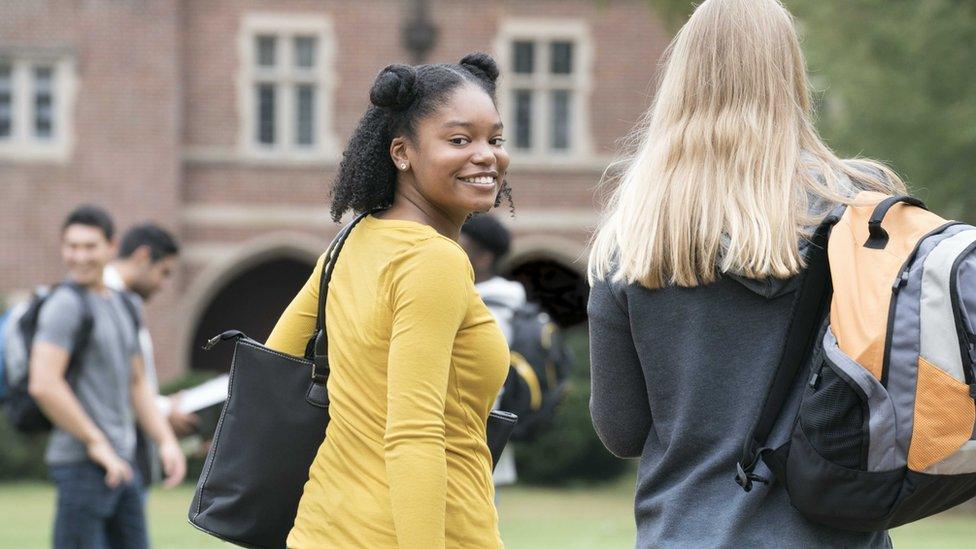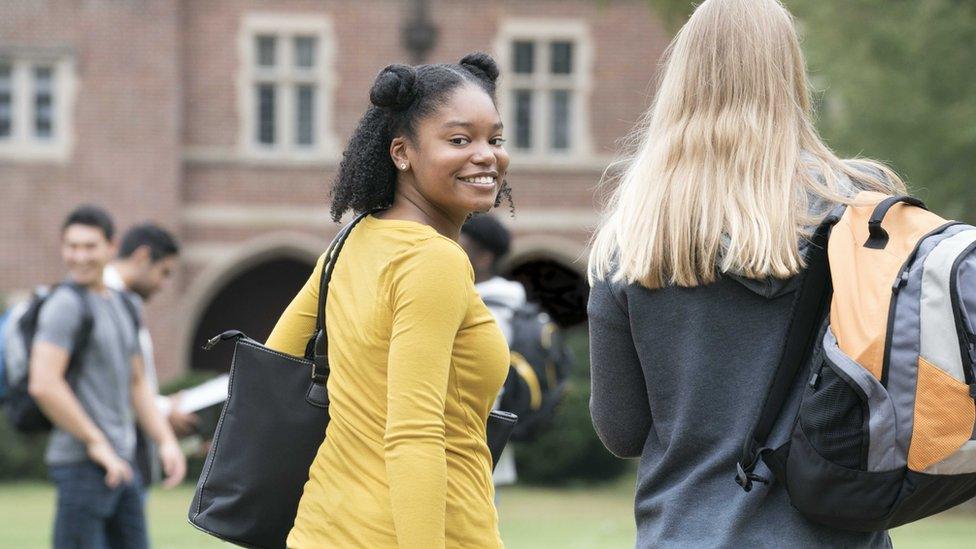Students must have say over online learning - regulator
- Published

Back on campus: Record numbers are heading to university this term
England's universities must take student views into account when deciding how much to teach online, says regulator the Office for Students.
With Covid restrictions lifted, the majority of teaching is expected to be face-to-face this year, says chief executive Nicola Dandridge.
But larger group teaching sessions, such as lectures, are likely to be online in many institutions.
And numerous universities have told the BBC they are using a mixed approach.
In a snapshot survey of 47 universities, just 13 said they would be offering mostly face-to-face tuition. The others say they are adopting a more blended approach.
And 19 institutions told the BBC they would be offering additional online learning resources.
It comes as hundreds of thousands of students are heading for university.
Last week, former education secretary Gavin Williamson told vice-chancellors at the Universities UK conference that he expected students to be "taught in person and alongside other students".
Ms Dandridge said she was expecting the overwhelming majority of universities and colleges to offer primarily face-to-face teaching.
But she said the experience of the pandemic had revealed "elements of online provision which are really valuable and really useful".
"So there will be elements of online provision where it suits students and where it works, in terms of quality of teaching, but primarily it is face-to face-teaching."
She added: "What we will be looking for is quality provision whether or not it's face-to-face or online.
"Critically, universities will be taking into consideration the views of students - what do they want, what is their feedback? And that then is factored into the course provision over the course of the next year."

Will Huddie petitioned the University of Leeds for face-to-face lessons
Last year, almost all the teaching Will Huddie received on his theoretical physics course at the University of Leeds was online.
"It was difficult," he said. "It's much more natural to discuss questions in person.
"There's so much value in having the lecturer explaining things to you when they're in front of you.
"Even after a year-and-a-half of using this online technology, no-one wants to be the person to put up their hand. The interactivity is really poor."
Outraged that teaching had remained online while Covid restrictions were lifted elsewhere, Will started a petition for a return to face-to-face teaching which was signed by thousands of others students.
Will's course is now due to be delivered entirely face-to-face in the coming year, but the lectures will also be streamed online for those self-isolating and international students who cannot reach the UK.
"I want entirely face-to-face - it's what I signed up for. I don't think blended learning would wash very well with UK students," he said.
A University of Leeds spokesperson said it was committed to working with students to ensure an active and engaged learning experience, using all of the campus and its digital resources.
"All seminars, tutorials, workshops, practical classes, performance activities and discussion groups will take place in person, with large-scale teaching events - supported by digital technology - taking place online."
'Flexibility'
A spokesman for the Russell Group of 24 top universities said they were looking forward to students returning to campuses.
"Students can expect most seminars, small group classes and lab work to be taught in person, alongside a range of extracurricular activity, social events and support services on campus."
But, he said, an element of digital learning would continue, with many large group lectures remaining online.
He said many students saw benefits to this approach which was more flexible and accessible.
National Union of Students vice-president for higher education Hillary Gyebi-Ababio called for online learning that enhanced and added to the in-person student experience - but that did not replace it entirely.
"We are concerned that for some universities, online learning is simply a cost-cutting exercise, brought about by universities needing to stay financially afloat in a competitive market," she said.
Related topics
- Published9 September 2021
